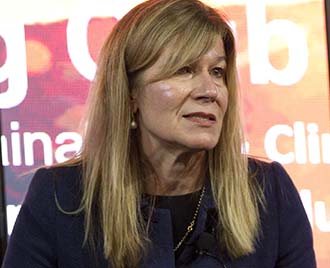S&P Global Offerings
Featured Topics
Featured Products
Events
S&P Global Offerings
Featured Topics
Featured Products
Events
S&P Global Offerings
Featured Topics
Featured Products
Events
Banking & Capital Markets
Economy & Finance
Energy Transition & Sustainability
Technology & Innovation
Podcasts & Newsletters
Banking & Capital Markets
Economy & Finance
Energy Transition & Sustainability
Technology & Innovation
Podcasts & Newsletters
S&P Global Offerings
Featured Topics
Featured Products
Events
21 May, 2021
By Anthony Barich
Answerable to increasingly climate-conscious investors, the future of Western Australia's mining sector depends on its ability to use hydrogen as fuel and in downstream processes, experts said May 20.
Discussing sustainability and climate change, Deloitte's energy transition and decarbonization partner, John O'Brien, said that just three years ago, he had been skeptical of the role hydrogen could play in the mining sector.
Now, he believes that "there are some niches where hydrogen is going to be the only way we're going to decarbonize things [in the mining sector], and those niches are really big."
"So if all the red dirt that happens to exist in Western Australia is going to continue having value, hydrogen has to work," particularly for iron ore and steel production, as well as for ammonia and chemicals, O'Brien said at a West Australian Mining Club industry panel in Perth, Australia.
Australia is the world's largest iron ore and lithium producer, primarily due to projects in Western Australia.
O'Brien's firm conducted an Australian and global hydrogen demand growth scenario analysis for the Australian government's national hydrogen strategy taskforce in 2019.
Though "blue hydrogen" made from fossil fuels is currently "a lot cheaper" even when done with carbon capture and storage compared to green hydrogen made from renewable energy, O'Brien questioned whether miners' customers would accept their use of fossil fuel-based, carbon-neutral hydrogen in the future.
 |
| Fortescue Metals Group's sustainability and corporate affairs director Alison Terry at a West Australian |
Australia's gas sector which currently helps feed miners' power needs is keen on coordinating with the mining sector to boost the use of blue hydrogen.
Fortescue Metals Group Ltd. sustainability and corporate affairs director Alison Terry said at the panel discussion that her company's decision to move "very rapidly" toward green hydrogen stemmed from its foundation in 2003 as an export-focused entity.
"What we now see is that hydrogen, and green hydrogen in particular, is a massive export opportunity for Australia," she said, especially for Western Australia, which gets more hours of sunshine per day than any other part of the country.
"Being able to harness that considerable renewable resource, along with wind, is going to be a game changer for this next part of our business," she added.
Pursuing green hydrogen was an important commercial imperative given Fortescue's modelling suggests it could end up using 1 billion liters of diesel a year in "just a few years" if it does not transition its energy sources, Terry said.
Richard Beazley, who was involved in the commissioning, commercialization and ongoing production of Sandfire Resources Ltd.'s pioneering solar project at its West Australian DeGrussa copper mine, told the panel that hydrogen is the best renewable energy option for miners going forward to replace diesel.
Battery shortfalls
Beazley, formerly Sandfire COO and now a director of Hydrogen Energy Pty. Ltd., which helps miners replace diesel and gas with green hydrogen energy, said "the difference between batteries as they stand today, and hydrogen, is significant."
The 6MWh lithium-ion battery that backed up the solar array and the diesel generation sets, or gen-sets, at DeGrussa would last "all of four minutes" if all else failed and the operation relied purely on the battery, he said.
This "surprises most people," he said, mainly due to a lack of understanding about the reality of how batteries work, he said.
The battery was still a "big win," as it allowed Sandfire to turn off a backup system that was burning half a million liters of diesel every month to ensure continuous supply in case one of the gen-sets failed, Beazley said.
"Looking forward, unless you can get renewables to work 90% of the day on an average day, you'll be looking at hydrogen longer term if you want to get away from fossil fuels," he said.
The Minerals Council of Australia's sustainability general manager, Chris McCombe, told the panel that in addition to the commitments individual mining companies are making to cut emissions, "we need to walk the talk," or miners risk "fairly significant reputational and practical" fallout consequences.
Terry said remuneration structures measuring performance against such emissions reduction targets are a "very practical way of focusing the mind."
"All companies are being held to account to the standards that they profess to support," she said.
